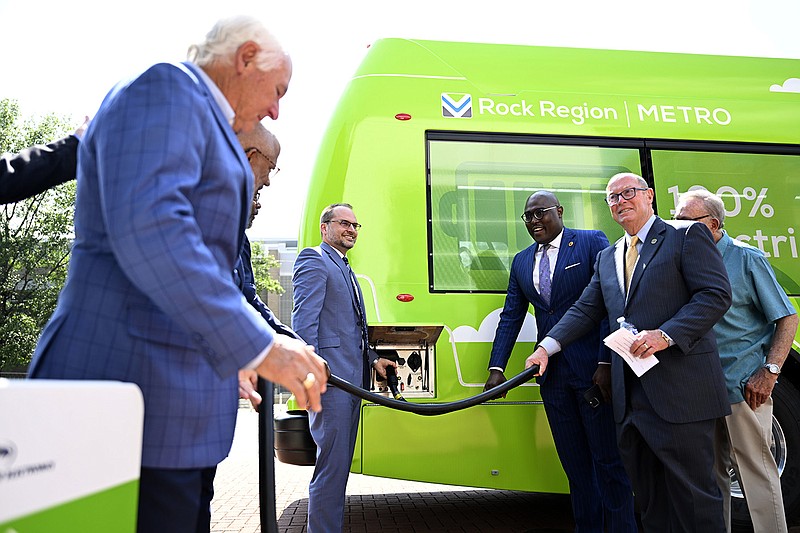Officials with the state's largest mass transit agency announced Tuesday the launch of its first five zero-emission mass transit buses, the first in the Natural State.
Rock Region Metro said it will place the 40-foot Proterra ZX5 Max vehicles in service on area streets in July after additional staff training. The buses were primarily funded by a 2021 $4.9 million Federal Transit Administration grant, Rock Region Metro's largest competitive grant award to date, to purchase the buses and their related charging infrastructure.
"An incredible amount of work has gone into getting this launched," said Justin Avery, chief executive officer at Rock Region Metro. "And I know I speak for everyone here when I say we will continue the efforts being made to make this happen. It is a proud day for the Natural State and Rock Region Metro."
The battery electric buses, or BEBs, will remove the last diesel buses in Rock Region Metro's fleet from service, effectively achieving a goal to complete its transition away from diesel-fueled vehicles by the end of 2025.
These buses have an operating range of 220 to 340 miles and operate with 738 kWh of power. Rock Region Metro has installed three Proterra Charging Systems Industrial Series 180kW charging cabinets at its headquarters that offer two 300-amp dispensers per cabinet, allowing all five vehicles to charge simultaneously if desired.
The BEBs have batteries with 12-year warranties, mirroring the Federal Transit Administration's 12-year "useful life" designation for tracking mass transit bus asset conditions and investments. The vehicles are the first Proterra vehicles in the Rock Region Metro fleet and in Arkansas.
Becca Green, chief communications officer for the transit agency, said the main difference passengers may notice is a quieter ride.
"As Arkansas establishes use of renewable energy to power its electrical grid, there is the potential to use renewable energy to power these vehicles, which is a first for mass transit bus operation state-wide," she added. "Many people, whether they ride or not, will appreciate this effort to reduce carbon emissions. This messaging about the 'greener grid' is on the bus itself."
Green also said the service's compressed natural gas buses will remain in use to "help maintain a diverse fleet to ensure reliable service from locally produced fuel."
"All of our vehicles, no matter how they are fueled, are designed with the most sustainable practice in mind, which is sharing your ride and therefore removing other vehicles off the streets, reducing potential carbon emissions and helping Central Arkansas meet air quality standards."
The first few months of operation will involve a charging management evaluation, as numerous factors affect the maximum operational range, including temperature, HVAC settings, driver behavior and terrain.
The buses will rotate on routes 3 Baptist Medical Center, 5 West Markham, 8 Rodney Parham, 10 McCain Mall, 14 Rosedale, 22 University Ave./Mabelvale and 23 Baseline/Southwest, which are the seven routes of the agency's 15 fixed routes that can support a 40-foot long vehicle (as opposed to a 35-foot vehicle, which has a tighter turning radius).
"As the state's largest public transit agency, serving Arkansas' urban core, we are accustomed to being the agency taking on new learning curves, and our foray into electric buses is no different than other Metro 'firsts' in that respect," said Avery. "We are thankful to our supporters, including the Arkansas federal delegation, for understanding the critical need to diversify our fleet with locally-produced alternate fuel options to ensure service stability and sustainability."
This initiative fulfills the U.S. Department of Transportation Strategic Plan Fiscal Year 2022-2026 climate and sustainability strategic objectives "to reduce air pollution and greenhouse gas emissions from transportation and advance a sustainable transportation system, as well as address the disproportionate negative environmental impacts of transportation on disadvantaged communities."
It meets the Arkansas Department of Transportation Long-Range Intermodal Transportation Plan objectives to "support multimodal transportation alternatives and intermodal mobility and supports initiatives to reduce congestion and improve air quality."
It also fulfills the Metroplan Central Arkansas 2050 long-range transportation plan goals to "foster quality corridors and transportation choices, support environmental quality and sustainable energy efforts, sustain healthy and safe communities, and promote economic growth and vitality."
